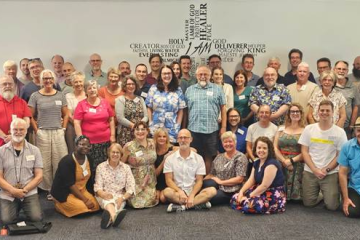Sheep may surprise you – Psalm 23
As animals, sheep have a certain reputation. We think of them as timid and use phrases like ‘as meek as a lamb’ or ‘as gentle as a lamb’. We consider the noise they make – bleating – synonymous with complaining in a way that is weak and irritating. And we do not credit them with much intelligence or being able to think for themselves. Being ‘a sheep’ or ‘like sheep’ means to behave in the same way as a group or to behave as you are told to behave.
And the commentators I read this week, thinking about Psalm 23, said much the same.
“Sheep,” said one, “need a leader so as not to wander aimlessly…. [They] have no defence against predators except for flocking, yet their instinctive flight response to danger can also cause panic and scattering.”
Or another, “Sheep are not brilliant creatures, and we cannot be flattered that the Psalm thinks of us as sheep. Leave a sheep without a shepherd, and he nibbles a bit of grass here, wanders over there for some more, sees a patch just past that rock; and before you know it the sheep is lost, or has fallen into a ravine, or been devoured by a wolf.”
Or this succinct comment, “If I am sheep, then I am dumb as a box of rocks!”
But sheep might surprise us!
I remember a pastor from Victoria some of you may know – Rev Meewon Yang – telling me that, just after she arrived in Australia, she took a trip outside of Melbourne and saw sheep grazing in a paddock for the first time. She watched them for ages, and as she watched them, the angrier and angrier she got! What she saw was sheep knowing exactly what they needed to do. They ate what they needed. (Australian scientists have found that sheep work out which plants are good for them and which aren’t, and even self-medicate when sick.) They found water themselves. They defended each other. (A University of California study has found rams form lasting friendships and support each other in fights.) And they knew the way to go. (From putting sheep through maze testing the CSIRO discovered sheep learn quickly, have superb spatial memory and retain that memory for at least six weeks.)
“What made me so angry,” Meewon said, “Was thinking about what the pastors in Korea had said to us about being our shepherds; that we had to listen to them, that they were the only ones who knew what to do and where to go. As I watched the sheep I realised, sheep are smart! And I realised that churches are full of smart sheep – that we can work out how to follow Jesus; that we can work out what loving Jesus and loving each other looks like. And I wanted to be a pastor who knew that about sheep – not the other kind.”
I had a similar moment to Meewon two years ago when Aron and I were on Iona in Scotland. We walked to St Columba’s Bay and we sat in the protection of the rocky outcrop there, because it was a little windy and rainy, and ate our lunch, after a while, I realised I had been watching for some time one sheep sitting on the grass near the beach. That what had intrigued me is that it was one sheep. It was not in a flock or a herd. It was by itself, and it looked entirely comfortable by itself! I remarked on it to Aron and he said, “Sometimes ewes need ewe time.” (Which I thought was very clever until I found it on a coffee mug in Inverness!)
Our psalm describes a shepherd who leads the sheep to pasture, to water, who guides them in the right paths, who walks beside them in darkest danger, but, in essence, it is a psalm of relationship. It is a psalm of relationship with the one who restores our soul. It is a psalm of relationship with the one who never leaves us, never forsakes us. There are fifty-five words in the Hebrew for this psalm and the word at the centre (the 28th word) is ‘you’; ‘you are with me’. At the very centre of this psalm is an expression of connection and trust with the God we have come to know, the God who is with us everywhere and with us always.
And we need to spend time with that ‘you’ too.
I was thinking about this when I got into the car Friday and there was an interview playing and it took me just a few sentences to work out it was a nun from the Benedictine Abbey at Jamberoo, Abbess Hilda Scott, describing their daily life – particularly the silence.
The silence takes a while to get used to, she said, and new arrivals, particularly, speak about the effect of the silence, of all the memories that come back during the times of silence. They say things like, “I haven’t thought about that in years!” Or, “I never realised that about myself.” And she used the wonderful analogy of a stew pot and how it has to be soaked in water and, when it is, the baked-on layers lift away, and it becomes clean. Silence, she said, is a way of going deeper, of “communicating with something that is deep”. And she said that anyone can practice silence – that everyone should practice – even just for five minutes during the day. “Don’t turn the radio on (like I had just done) the moment you get in the car,” she said. “Or go and stand in your backyard and listen to everything going on around you.” And as you spend time in silence, she said, you will crave more. “Silence shapes the soul. It shapes the very centre of you, and it makes for beauty in this world.”
We need time in silence. Time going deeper. Time communicating with something that is deep. We need to be deep sheep.
Finally, my final surprising discovery, is that sheep like adventures!
I realised this still sitting at St Columba’s Bay because I worked out – after a while – that the ewe was not entirely alone; that about thirty metres away were twin lambs, her lambs, playing. And I almost couldn’t watch them as they were climbing and clambering about, chasing each other, up and down the cliff face. Any moment now I thought one of them is going to tumble down the rocks into the sea.
We tend to associate this psalm with death. Because, of all the translations, the King James Version, ‘The valley of the shadow of death,’ is the most famous. And because we misread the final verses, “Surely goodness and mercy will follow me all the days of my life and I shall dwell in the house of the Lord forever.” The phrase actually ends with a re-iteration of life and living, “I shall dwell in the house of the Lord my whole life long”; the house of the Lord being – not a mansion in the sky – but the Temple, the place of communion with God.
Yes, this is a psalm that promises God is with us in our dying, but it is a psalm that promises even more that God is with us in our living, in every aspect of our lives. There is a playful element in these final verses – for the word ‘follow’ (radap), “Surely goodness and mercy shall follow me…” is often found in the Hebrew Scriptures in the context of enemies, is often translated ‘pursue’. The New Living and the Message versions use these words, “Surely your goodness and unfailing love will pursue me all the days of my life.” Like those playful lambs pursuing each other the psalm turns the image of a pursuing enemy – the fears that haunt us – into something wonderful and good and life-affirming. The one who walks with us through the darkest times in our lives – for they do come – will also pursue us with good; with hope, with joy, with transformation, with new life, with adventure!
We are smart sheep, deep sheep, adventurous sheep.
I read that in Great Britain, on the Yorkshire Moors, sheep farmers have reported that sheep have learned how to get across cattle guards. They can do it by carefully balancing on the bars with their hooves, but they also lie down beside the cattle guards and then roll across them. I don’t know about you, but I imagine a kind of ‘Mission Impossible’ theme playing in the background.
Yes, “The Lord is our shepherd…” and, “We are the people of his pasture, the sheep of his hand.” And we are adventurous sheep – sheep called to live the adventure of life God calls us to – to live life abundantly. We are sheep that need to go deep, to spend time with the shepherd who knows each of us by name. And we are smart sheep, sheep who like real sheep recognise the face, know the voice, of the good shepherd – one who goes so far as to lay down his life for his sheep – and we will follow that shepherd day by day and hour by hour our whole lives long.


